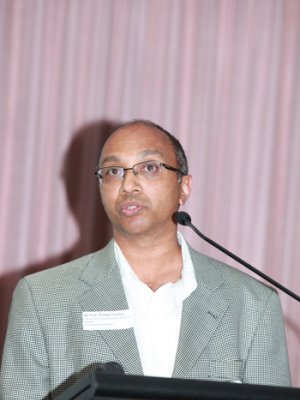
Negotiating Communication Rights, a critical review of communication for social change movements in India authored by Associate Professor Pradip Thomas, has just been released by Sage Publications.
The book is the second in a three volume series on the media in India, which Dr. Thomas, the co-director of the Centre for Communication and Social Change, was inspired to produce during a sabbatical in the country last year.
Political economy of communications in India - the Good, the Bad and the Ugly, released in 2010, is the first in the series, and the third manuscript on ‘the digital and social change’ is currently under review.
“The civil society groups working in communication rights in India are so vibrant and active; communication activists are really causing havoc for the government and other institutions. They are fighting to safeguard the right to communication, which I see as critical for substantive democracy,” Dr Thomas said.
Communication rights go beyond freedom of opinion and expression. It includes areas such as democratic media governance, media ownership and control, participation in one’s own culture, linguistic rights, and rights to education, privacy, peaceful assembly, and self-determination.
“These are highly contested issues; last year six or seven activists were killed as a result of their work confronting corruption and promoting accountability and transparency”.
Beginning with the theoretical aspects of communication rights, Dr. Thomas’s book deals with five case studies related to significant movements of our times, namely, the Right to Information, Free and Open Source Software, Women and Media, Community Radio, and Citizen Journalism. It also analyses the complexity of specific rights issues in India, such as women’s rights, citizen activism and the role of media.
Of the five case studies, Dr Thomas says the Right to Information and the Free and Open Source Software movements inspired him the most.
“India is at the forefront of these two movements. The agitation for change in these areas has come from the village level, not funded from the outside; they are perfect examples of effective grass-roots social change.
“The Free and Open Source Software movement is particularly interesting and it shows the state and civil society coming together to form better, more egalitarian e-governance systems. And the movement now has evangelists within the state.
“People have fought for their rights in Australia and for the most part live very comfortable lives; however it is dangerous to become complacent about communication issues such as media diversity and communication monopolies, which significantly impede real democracy. There are significant lessons for media activists in Australia from these movements in India,” Dr Thomas said.
Dr Thomas is a leading academic in the area of communication and social change, communication rights and the political economy of communications. Negotiating Communication Right, published by Sage Publications is available now.
Media: Siena Perry, 07 3346 3092 or siena.perry@uq.edu.au
.jpg)

